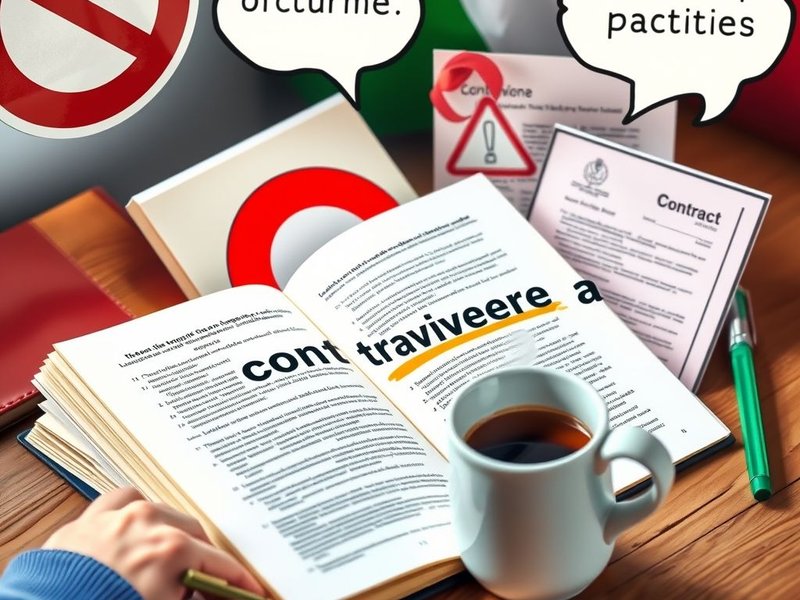How to Use "Contravvenire a": Meaning and Practical Examples
Learning Italian also means mastering those expressions that make your speech more natural and authentic. Today, we're focusing on a common but often misunderstood phrasal verb: contravvenire a. Have you ever wanted to say that someone didn't follow a rule or an order but didn't know which verb to use? Many Italian learners at a B1 or B2 level struggle with this expression. In this guide, we’ll explore the exact meaning of contravvenire a, its grammatical structure, practical examples, and how to avoid the most common mistakes. Get ready to use this verb with confidence!

Table of Contents
- What does “Contravvenire a” mean?
- Grammatical Structure: How Is It Used?
- Sentences and examples with “Contravvenire a”
- Crucial Differences: Common Mistakes to Avoid
- Similar or Related Expressions
- Conclusion
More: How to Use Continuare a Meaning and Practical Examples
What does “Contravvenire a” mean?
- Literal Meaning: To act against an order, a law, or an obligation, by not respecting or by going against it.
- Example: "L'automobilista ha contravvenuto al codice della strada."
- Figurative Meaning: To disregard a principle, a social convention, or an implicit expectation, going against what is established or expected.
- Example: "Contravvenire alla buona educazione è considerato scortese in società."
More: How To Use Contribuire a Meaning Usage Practical Examples
Grammatical Structure: How Is It Used?
The structure of contravvenire a is quite fixed and simple. It follows this pattern:
[Subject] + contravvenire (conjugated) + a + [Noun/Pronoun/Rule/Norm/Law/Agreement]
The verb contravvenire is an intransitive verb, which means it requires the preposition a to introduce the indirect object, meaning what is being transgressed. This object is almost always an abstract entity like a rule, law, order, prohibition, or agreement. Remember that a is a fixed preposition and cannot be omitted or replaced with other prepositions.
Sentences and examples with “Contravvenire a”
Here are a few practical examples to understand how to use contravvenire a in real contexts:
📍 Context: Work
Person A: “Il nuovo impiegato ha contravvenuto alla politica aziendale usando il cellulare durante le riunioni.”
Person B: “Capisco, dovrà essere richiamato per questo.”
📍 Context: Family
Person A: “Mia figlia ha contravvenuto al mio divieto di uscire dopo mezzanotte.”
Person B: “Ah, i ragazzi… capita spesso, purtroppo.”
📍 Context: Legal / Administrative
Person A: “Il Comune ha emesso una multa perché la costruzione ha contravvenuto alle norme edilizie.”
Person B: “Dobbiamo verificare i permessi allora, è grave.”
📍 Context: Moral / Social
Person A: “Credo che il suo comportamento abbia contravvenuto alle buone maniere.”
Person B: “Sì, non si è comportato con la dovuta cortesia.”
Crucial Differences: Common Mistakes to Avoid
A common mistake is to confuse contravvenire a with other similar verbs, or to use it in improper contexts. Let’s see the crucial differences:
Contravvenire a vs. Violare
These two verbs are often used as synonyms, but have slightly different nuances. While both mean to break a rule, contravvenire a is more formal and specific.
Contravvenire a: This refers specifically to the transgression of rules, laws, orders, regulations, or agreements. It often implies a direct legal or administrative consequence. It has a more bureaucratic or official connotation. As the Accademia della Crusca explains, the verb
contravvenire(from Latin contra venire) is "to act in a contrary manner, to transgress".- Example: "L'azienda ha contravvenuto alle direttive sulla sicurezza sul lavoro." (There is a specific directive)
Violare: This is a broader, more generic term. It can refer to the breaking of rules, but also to the violation of physical spaces (a property), rights (privacy), or feelings and promises. It has a stronger and sometimes more 'invasive' or destructive connotation.
- Example: "Il pirata informatico ha violato i dati personali degli utenti." (Not a law, but a right)
- Example: "Non violare la mia fiducia." (Not a formal rule)
Contravvenire a (formal) vs. Non rispettare (generic)
Contravvenire a: Has a more formal tone and is used mainly for laws, regulations, orders, or written agreements.
- Example: "Il costruttore ha contravvenuto ai termini del contratto." (Formal, legal)
Non rispettare: This is a more common and general expression, used in any context to indicate the lack of respect for a rule, a person, a promise, etc.
- Example: "Il bambino non ha rispettato le regole del gioco." (Generic, informal)
- Example: "Non rispetto la sua opinione." (Referring to a person)
Similar or Related Expressions
To enrich your practical Italian vocabulary and communicate more effectively in Italian, here are some similar or related expressions to contravvenire a:
| Similar Expression | Brief Meaning | Example |
|---|---|---|
| Trasgredire (a) | Not observing, not respecting a rule. | "Ha trasgredito alle regole del buon senso." |
| Infrangere | To break a rule, a promise, or a pact. Stronger and more decisive. | "Hanno infranto ogni divieto." |
| Disattendere | Not taking into account an order, advice, or obligation. Less formal than "contravvenire". | "Ha disatteso le mie aspettative." |
| Trasgredire (a) | Not observing, not respecting a rule. | "Ha trasgredito alle regole del buon senso." |
Conclusion
We have explored the meaning and use of the phrasal verb contravvenire a, understanding its structure and the differences with similar expressions. This verb is fundamental to express the breach of rules or orders in Italian, especially in formal contexts.
Now it’s your turn! Try writing a sentence using "contravvenire a" in the comments below. What rule or prohibition comes to your mind?